How can we describe our 30th anniversary celebration of this past 29th May? Certainly it was a moment of great joy, experienced by many forming a virtual chorus from every corner of the world. Here is an attempt to recount the most salient passages (first part).
by Antonella Ferrucci
Saturday 29 May: I am in Loppiano, among the few who have the privilege of attending the 30th anniversary celebration of the EoC live. In the Auditorium there are few people and a silent atmosphere, almost of suspense: we have prepared with extreme care, editing the programme down to the smallest detail, now all we have to do is "press the Play button" and everything will start?
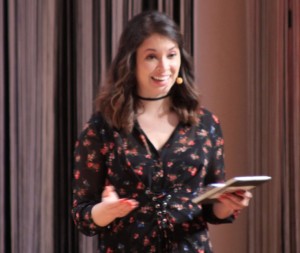 Six YouTube channels broadcast our celebration in as many ‘official’ translations of the programme (Italian, English, French, Spanish, Portuguese and Korean), while the German and Slovak translations are organised locally. In the control room there is great concentration: the start of the live broadcast is delayed by a few minutes, then the opening credits and... the celebration starts with a story that will be the evocative leitmotif for the whole afternoon, the "Flowered tale on the Foco path", interpreted by Valentino Borgo. The story of the landing on San Paolo in May 30 years ago, interpreted by Emanuela Pantano takes us back to those days: it is with deep emotion we relive the moment of the launch of the EoC from the living words of Chiara Lubich on 29 May 1991. The scenography created by Jean Paul Carradori using the video mapping technique, under the direction of Maria Mata Calò, frames and enhances every moment.
Six YouTube channels broadcast our celebration in as many ‘official’ translations of the programme (Italian, English, French, Spanish, Portuguese and Korean), while the German and Slovak translations are organised locally. In the control room there is great concentration: the start of the live broadcast is delayed by a few minutes, then the opening credits and... the celebration starts with a story that will be the evocative leitmotif for the whole afternoon, the "Flowered tale on the Foco path", interpreted by Valentino Borgo. The story of the landing on San Paolo in May 30 years ago, interpreted by Emanuela Pantano takes us back to those days: it is with deep emotion we relive the moment of the launch of the EoC from the living words of Chiara Lubich on 29 May 1991. The scenography created by Jean Paul Carradori using the video mapping technique, under the direction of Maria Mata Calò, frames and enhances every moment.
Presenters Melissa Mejía Flórez and Tommaso Bertolasi greet the listening hubs around the world: people are connected in small groups from the USA, (N.Y., Washington, Los Angeles, Indianapolis, Chicago, Omaha, Atlanta, San Francisco, Philadelphia), from Russia (Moscow and Siberia), from Argentina, from various African nations: Cameroun, Angola (Luanda, Huambo), Benin (Cotonou), Burkina Faso, the Ivory Coast, Nigeria, Congo, Madagascar (Ambatondrazaka, Antananarivo, Tulear). From Cuba (Havana, Camaguey, Artemisa, Santiago) and the United Arab Emirates (Dubai) and also from Europe from Hungary, Slovakia, Portugal, Belgium, Croatia, France (Arny) and from some 15 different points in Italy. Where it is not possible to gather in groups due to the pandemic (as in Brazil), people participate from their homes. The first exciting connection (and it just had to be that way) is with Brazil.
The afternoon will be divided into five macro-topics. In this article we will review the first two: the density of the proposed content is such that if we summarise too much, 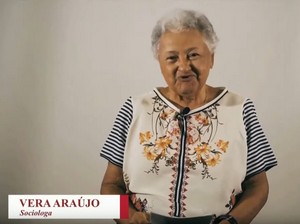 we risk losing some "precious pearls". "Economy of Communion, from the origins to today” is the title of the first part of the programme and in it, the story of the historical and spiritual origins of the Economy of Communion unfolds, starting from the origins of the Focolare Movement in Trent. In her intervention from Brazil, her home country, Vera Araujo recalls her own experience of "announcing" the EoC to audiences of all kinds and all over the world and underlines how necessary and urgent it is for the future to have a greater and more decisive commitment to the theoretical elaboration of the founding elements of the EoC.iso nell’elaborazione teorica degli elementi fondanti dell’EdC.
we risk losing some "precious pearls". "Economy of Communion, from the origins to today” is the title of the first part of the programme and in it, the story of the historical and spiritual origins of the Economy of Communion unfolds, starting from the origins of the Focolare Movement in Trent. In her intervention from Brazil, her home country, Vera Araujo recalls her own experience of "announcing" the EoC to audiences of all kinds and all over the world and underlines how necessary and urgent it is for the future to have a greater and more decisive commitment to the theoretical elaboration of the founding elements of the EoC.iso nell’elaborazione teorica degli elementi fondanti dell’EdC.
What elements must be transmitted to future generations so that the EoC remains faithful to Chiara's dream? The answers to this question arrive with contributions from 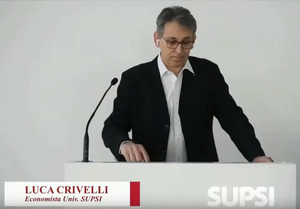 all over the world. It is time for Luca Crivelli's presentation who describes the four intuitions that have marked the last ten years of the EoC's history: a time in which much effort has been made to develop Chiara's original idea, also by updating the structures and the very range of action of the Economy of Communion. The Youth Project with its Summer Schools from 2011 to 2017 in many places around the world: some oriented more to doing business, others to academic work and economic thinking - but always happening with the active participation of young people, scholars and entrepreneurs together. A project crowned in 2018 by the Prophetic Economy event, with the extraordinary involvement of adolescents, and in 2020 by the response of over 2000 young people from all over the world to Pope Francis' appeal, which led to the birth of the Economy of Francesco.
all over the world. It is time for Luca Crivelli's presentation who describes the four intuitions that have marked the last ten years of the EoC's history: a time in which much effort has been made to develop Chiara's original idea, also by updating the structures and the very range of action of the Economy of Communion. The Youth Project with its Summer Schools from 2011 to 2017 in many places around the world: some oriented more to doing business, others to academic work and economic thinking - but always happening with the active participation of young people, scholars and entrepreneurs together. A project crowned in 2018 by the Prophetic Economy event, with the extraordinary involvement of adolescents, and in 2020 by the response of over 2000 young people from all over the world to Pope Francis' appeal, which led to the birth of the Economy of Francesco.
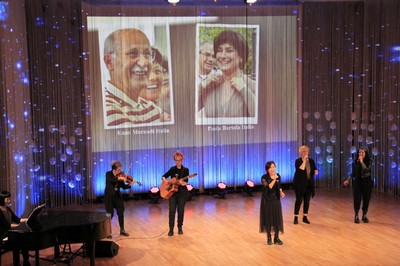 A second intuition, starting in 2013, was to cultivate, with greater determination and awareness, entrepreneurial vocations, in order to encourage generational change and inspire new vocations, raising the prophetic rate and the universality of the proposal: a way forward for a fraternal economic world. This gave rise to the EoC-IIN, business incubators, of which there are now 15 worldwide. A third insight concerns the issue of poverty and aid to those in need: a study evaluated the aid management system applied in the first twenty years and highlighted certain critical points. We understood the need for an observatory of poverty that would allow us to understand the specifics of our action, the idea of development that underlies the Economy of Communion, and allow us to dialogue with those in the world who are at the frontier of innovation in the field of the fight against poverty. This is how OPLA was born, the observatory of poverty named after Leo Andringa. Finally, 'Networking with others'. The EoC is called to network with other economic charismas and with social and civil economy initiatives that seek to reform the capitalist economic system by humanising markets and businesses. This is because "The EoC flourishes when it enters into dialogue with the world's most authoritative economists and boldest and most innovative social entrepreneurs.” The account of the last 10 years concludes with a remembrance in pictures of the EoC entrepreneurs who have left us: a moving moment thanks also to the Gen Verde song that accompanied it.
A second intuition, starting in 2013, was to cultivate, with greater determination and awareness, entrepreneurial vocations, in order to encourage generational change and inspire new vocations, raising the prophetic rate and the universality of the proposal: a way forward for a fraternal economic world. This gave rise to the EoC-IIN, business incubators, of which there are now 15 worldwide. A third insight concerns the issue of poverty and aid to those in need: a study evaluated the aid management system applied in the first twenty years and highlighted certain critical points. We understood the need for an observatory of poverty that would allow us to understand the specifics of our action, the idea of development that underlies the Economy of Communion, and allow us to dialogue with those in the world who are at the frontier of innovation in the field of the fight against poverty. This is how OPLA was born, the observatory of poverty named after Leo Andringa. Finally, 'Networking with others'. The EoC is called to network with other economic charismas and with social and civil economy initiatives that seek to reform the capitalist economic system by humanising markets and businesses. This is because "The EoC flourishes when it enters into dialogue with the world's most authoritative economists and boldest and most innovative social entrepreneurs.” The account of the last 10 years concludes with a remembrance in pictures of the EoC entrepreneurs who have left us: a moving moment thanks also to the Gen Verde song that accompanied it.
The first section of the programme ends with a second question addressed to all: "What is the specific contribution that each generation of entrepreneurs has made to the EoC to date?” Many answers were collected in the video contributions from all over the world.
We move on to the second topic of the afternoon, "One company is not enough," which opens with an excerpt from Chiara Lubich's lecture at the University of Piacenza, on the occasion of her Honoris Causa in 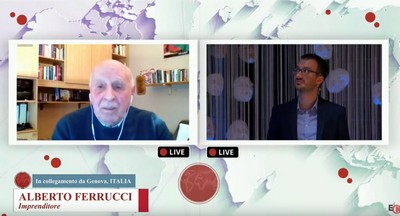 Economics on January 29, 1999, in which Chiara describes the EoC in all its aspects. Then the intervention of Alberto Ferrucci, entrepreneur and "pioneer" of the EoC. He was asked the question: What have entrepreneurs learned from the EoC? Alberto describes the immediate and generous response of the entrepreneurs to Chiara's proposal in the first years and the experiences that followed. From the practice of the Economy of Communion, the entrepreneurs understand that the Gospel promises of "give and it will be given to you" are true and also work at work: "experiencing Providence is worth much more to the entrepreneur than its economic value, it is confirmation that the culture of giving is not naivety, if anything it is ingenuity." And what has the EoC learned from entrepreneurs? "To the Economy of Communion the entrepreneur brings professional seriousness, fidelity in sharing profits, resilience and optimism in facing the pandemic, technological innovation, a climate change. Above all, they bring the awareness that their company is also a public good, because it offers useful goods and services and, above all, jobs that fulfil the people around them."
Economics on January 29, 1999, in which Chiara describes the EoC in all its aspects. Then the intervention of Alberto Ferrucci, entrepreneur and "pioneer" of the EoC. He was asked the question: What have entrepreneurs learned from the EoC? Alberto describes the immediate and generous response of the entrepreneurs to Chiara's proposal in the first years and the experiences that followed. From the practice of the Economy of Communion, the entrepreneurs understand that the Gospel promises of "give and it will be given to you" are true and also work at work: "experiencing Providence is worth much more to the entrepreneur than its economic value, it is confirmation that the culture of giving is not naivety, if anything it is ingenuity." And what has the EoC learned from entrepreneurs? "To the Economy of Communion the entrepreneur brings professional seriousness, fidelity in sharing profits, resilience and optimism in facing the pandemic, technological innovation, a climate change. Above all, they bring the awareness that their company is also a public good, because it offers useful goods and services and, above all, jobs that fulfil the people around them."
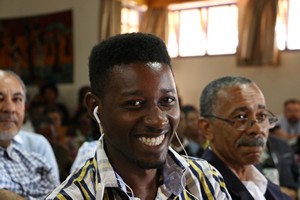 The story of the company Belazik founded by Belami Paluku in the Democratic Republic of Congo also thanks to the support and friendship of Koen, Fred and Lieve that sprung up in Nairobi in 2015, introduces us to the international network EoC-IIN, which arose in 2016 and deals with the incubation of new companies, characterised by a positive social impact, inspired and guided by the principles of the Economy of Communion. Isaias Hernando tells us about it: "a community of entrepreneurs and professionals who share their talents, time and experience to foster the growth of a new generation of "special and virtuous" people and businesses, certain that the economy can be a vehicle for integral human development.” Isaias concludes by inviting other EoC entrepreneurs to generously join the project by sharing their talents.
The story of the company Belazik founded by Belami Paluku in the Democratic Republic of Congo also thanks to the support and friendship of Koen, Fred and Lieve that sprung up in Nairobi in 2015, introduces us to the international network EoC-IIN, which arose in 2016 and deals with the incubation of new companies, characterised by a positive social impact, inspired and guided by the principles of the Economy of Communion. Isaias Hernando tells us about it: "a community of entrepreneurs and professionals who share their talents, time and experience to foster the growth of a new generation of "special and virtuous" people and businesses, certain that the economy can be a vehicle for integral human development.” Isaias concludes by inviting other EoC entrepreneurs to generously join the project by sharing their talents.
The third passage of our afternoon will be dedicated to "Sister Poverty"... But I will tell you about this in the next part... (to be continued...)
 Look at the Photogallery
Look at the Photogallery

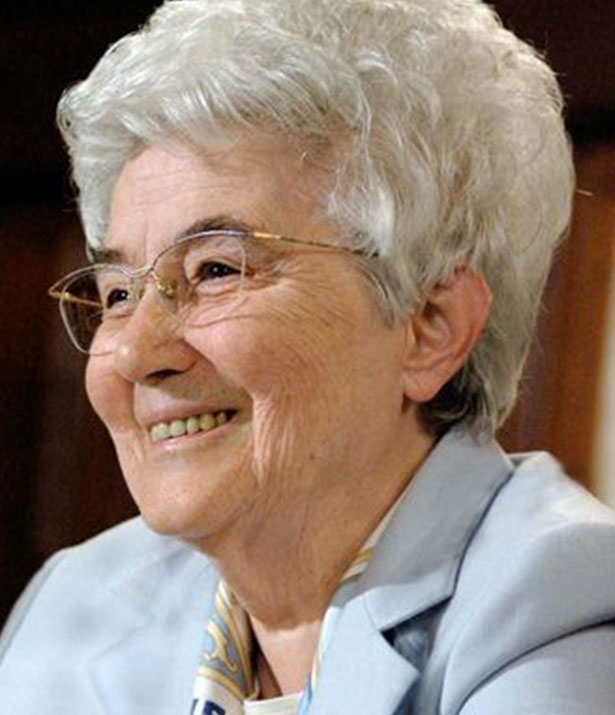
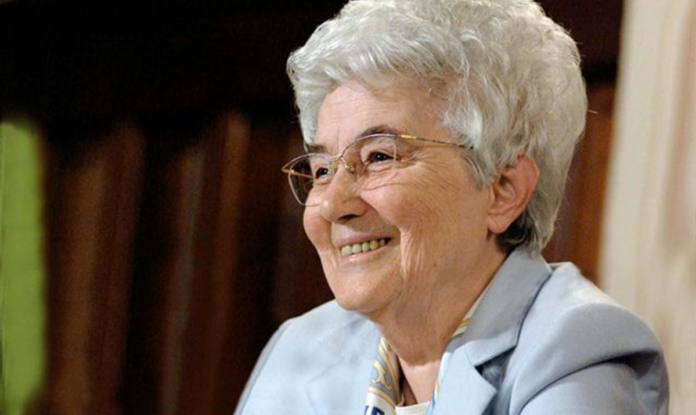

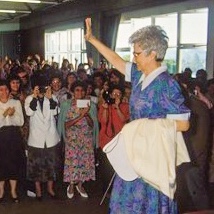
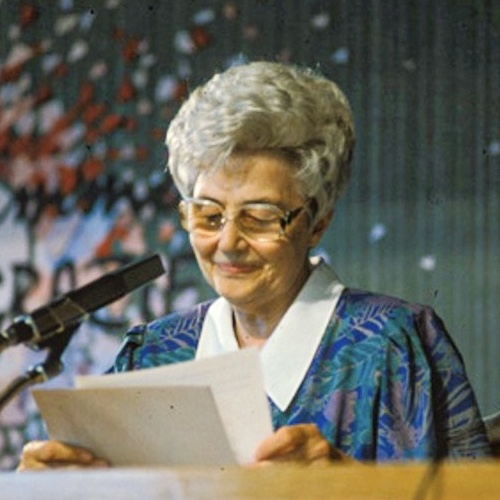
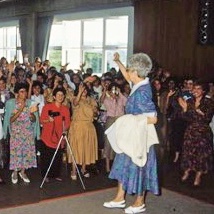










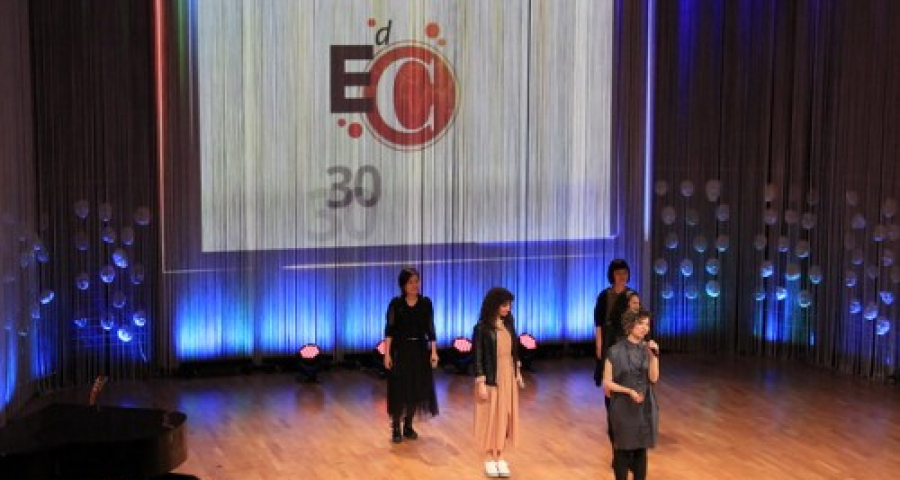

 we risk losing some "precious pearls". "Economy of Communion, from the origins to today” is the title of the first part of the programme and in it, the story of the historical and spiritual origins of the Economy of Communion unfolds, starting from the origins of the Focolare Movement in Trent. In her intervention from Brazil, her home country, Vera Araujo recalls her own experience of "announcing" the EoC to audiences of all kinds and all over the world and underlines how necessary and urgent it is for the future to have a greater and more decisive commitment to the theoretical elaboration of the founding elements of the EoC.iso nell’elaborazione teorica degli elementi fondanti dell’EdC.
we risk losing some "precious pearls". "Economy of Communion, from the origins to today” is the title of the first part of the programme and in it, the story of the historical and spiritual origins of the Economy of Communion unfolds, starting from the origins of the Focolare Movement in Trent. In her intervention from Brazil, her home country, Vera Araujo recalls her own experience of "announcing" the EoC to audiences of all kinds and all over the world and underlines how necessary and urgent it is for the future to have a greater and more decisive commitment to the theoretical elaboration of the founding elements of the EoC.iso nell’elaborazione teorica degli elementi fondanti dell’EdC. all over the world. It is time for Luca Crivelli's presentation who describes the four intuitions that have marked the last ten years of the EoC's history: a time in which much effort has been made to develop Chiara's original idea, also by updating the structures and the very range of action of the Economy of Communion. The Youth Project with its Summer Schools from 2011 to 2017 in many places around the world: some oriented more to doing business, others to academic work and economic thinking - but always happening with the active participation of young people, scholars and entrepreneurs together. A project crowned in 2018 by the
all over the world. It is time for Luca Crivelli's presentation who describes the four intuitions that have marked the last ten years of the EoC's history: a time in which much effort has been made to develop Chiara's original idea, also by updating the structures and the very range of action of the Economy of Communion. The Youth Project with its Summer Schools from 2011 to 2017 in many places around the world: some oriented more to doing business, others to academic work and economic thinking - but always happening with the active participation of young people, scholars and entrepreneurs together. A project crowned in 2018 by the  A second intuition, starting in 2013, was to cultivate, with greater determination and awareness, entrepreneurial vocations, in order to encourage generational change and inspire new vocations, raising the prophetic rate and the universality of the proposal: a way forward for a fraternal economic world. This gave rise to the
A second intuition, starting in 2013, was to cultivate, with greater determination and awareness, entrepreneurial vocations, in order to encourage generational change and inspire new vocations, raising the prophetic rate and the universality of the proposal: a way forward for a fraternal economic world. This gave rise to the  Economics on January 29, 1999, in which Chiara describes the EoC in all its aspects. Then the intervention of Alberto Ferrucci, entrepreneur and "pioneer" of the EoC. He was asked the question: What have entrepreneurs learned from the EoC? Alberto describes the immediate and generous response of the entrepreneurs to Chiara's proposal in the first years and the experiences that followed. From the practice of the Economy of Communion, the entrepreneurs understand that the Gospel promises of "give and it will be given to you" are true and also work at work: "experiencing Providence is worth much more to the entrepreneur than its economic value, it is confirmation that the culture of giving is not naivety, if anything it is ingenuity." And what has the EoC learned from entrepreneurs? "To the Economy of Communion the entrepreneur brings professional seriousness, fidelity in sharing profits, resilience and optimism in facing the pandemic, technological innovation, a climate change. Above all, they bring the awareness that their company is also a public good, because it offers useful goods and services and, above all, jobs that fulfil the people around them."
Economics on January 29, 1999, in which Chiara describes the EoC in all its aspects. Then the intervention of Alberto Ferrucci, entrepreneur and "pioneer" of the EoC. He was asked the question: What have entrepreneurs learned from the EoC? Alberto describes the immediate and generous response of the entrepreneurs to Chiara's proposal in the first years and the experiences that followed. From the practice of the Economy of Communion, the entrepreneurs understand that the Gospel promises of "give and it will be given to you" are true and also work at work: "experiencing Providence is worth much more to the entrepreneur than its economic value, it is confirmation that the culture of giving is not naivety, if anything it is ingenuity." And what has the EoC learned from entrepreneurs? "To the Economy of Communion the entrepreneur brings professional seriousness, fidelity in sharing profits, resilience and optimism in facing the pandemic, technological innovation, a climate change. Above all, they bring the awareness that their company is also a public good, because it offers useful goods and services and, above all, jobs that fulfil the people around them." The story of the company Belazik founded by Belami Paluku in the Democratic Republic of Congo also thanks to the support and friendship of Koen, Fred and Lieve that sprung up in Nairobi in 2015, introduces us to the international network
The story of the company Belazik founded by Belami Paluku in the Democratic Republic of Congo also thanks to the support and friendship of Koen, Fred and Lieve that sprung up in Nairobi in 2015, introduces us to the international network 





